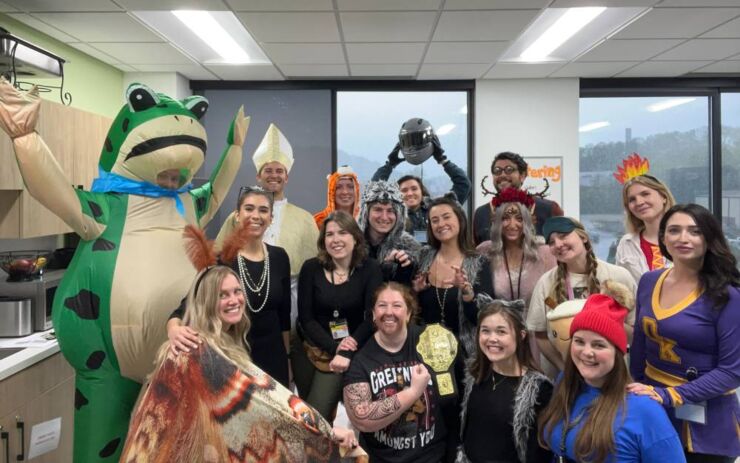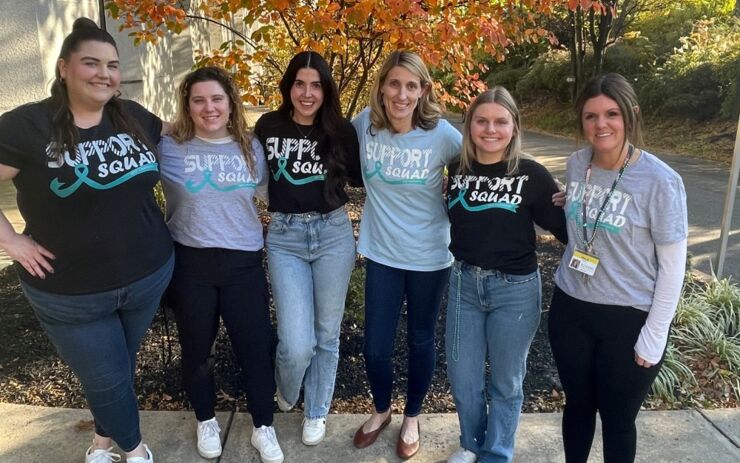Three-time Paralympian uses her experience to help patients at Rogers–Brown Deer
02/13/17 07:31:amBecca Murray isn’t your average clinic assistant. She’s a remarkable athlete who’s competed in two world championship basketball games and three Paralympic games—all on two wheels. In 2008, Becca helped Team USA bring home the gold from China; in 2012, the team placed fourth in London; and this year, she was the leading scorer on the record-breaking team in Rio, which also won gold.
“Becca is not one to ever shy away from a challenge,” says Jessica Pitre, clinical services manager at Rogers–Brown Deer. “She has even stepped outside her normal role here in Brown Deer and has talked to our younger patients about overcoming her challenges and her experiences in the Paralympics. She’s even brought in her gold medals to share with them, which has been an extremely powerful experience. The kids love it!”
From our exclusive interview with Becca:
Q: What’s your role at Rogers?
A: I have a few roles. I work as a clinic assistant with children and adults, an intake specialist in the admissions department and fill in wherever else I’m needed. As a clinic assistant, I help patients and families get the information they need and file their information. As an intake specialist, I help admit our patients, fill out their paperwork, and answer any questions patients or families may have before they begin treatment.
Q: How has basketball affected your work?
A: When I give presentations to kids in day treatment, I talk about how wheelchair basketball has given me different opportunities in life. They really engage and ask me questions about my disability or the sport itself.
Basketball has taught me a lot of things that transition into the workplace, like how to be dependable and work hard to reach my goals. At Rogers, you really need to be part of a team can so we can give our patients the best care possible. Just like in basketball, each team member has unique talents and a valuable role. The difference is, basketball is more of a physical demand, whereas being part of a care team is more of a mental and emotional demand.
Q: How did you begin your career in basketball and were you always a good player?
A: When I was six years old, my mom found recreational sports for me to play in: street hockey, ice hockey, softball and more. Eventually she found a basketball team for me to join and I just fell in love with it. In 2008, I playing began playing for the University of Wisconsin–Whitewater and won three national championships. Many of my fellow teammates for the Paralympics also played for UW-Whitewater.
Becoming a good player took a lot of practice. My junior’s team was mostly men, so I had to stick it out and prove to them that I could hang with them. They’re two different games, but I always felt the men’s games were a little more aggressive. It taught me at a young age to not back down.
Q: When did you realize this was going to be one of your passions?
A: When I was in middle school, I started meeting Paralympians at the time. Hearing their story and how wonderful it was to travel and win medals was so inspiring. Then I knew it was something I wanted to work towards.
Q: What was it like being a veteran player and leader on the team?
A: I’m actually a pretty reserved person and I don’t say a lot, but I lead by actions. I was honored to be in a position where my teammates looked to me as a leader and wanted to follow my example. I just tried to offer my knowledge of the game. In return, the younger players brought the energy of how cool it is to be at the Paralympics. As a veteran player, you can take things for granted. But because it was their first time, you could see in their eyes how cool it was.
Q: While you were working, what was your training schedule like?
A: After work, four days a week, I would go to the gym to get in my conditioning and shooting practice. We’d also have a long weekend training camp in Colorado Springs once a week. My schedule would get stressful at times, but Rogers was so supportive. Everyone was so willing to work with my schedule and thought it was cool that I was going to be part of the Paralympics. Right before I left, the staff brought a cake to the breakroom and I knew everybody was watching our games. When I came back with the gold, everyone wanted me to bring in the medal so they could see it.
Q: Was there something special about this year, driving you to win?
A: In 2012, we came up short in London and ended up taking fourth place. I guess that bitter taste in my mouth—of not performing the way you wanted to get that gold medal—really drove me to work harder and be on top in 2016.
Becca recently declared this Paralympics as her last. Even though she’s formally retired from the game, she wants others to continue learning about and appreciating the challenge of the sport. “A lot of people think wheelchair basketball has special rules or regulations, but the hoop height and floor are exactly the same, we just can’t use our legs to jump and push the ball towards the hoop,” she says. “Go out and watch it or give it a try yourself! When people watch a game, they’re really surprised at how aggressive it can be.”





